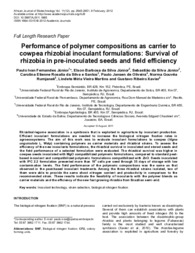Performance of polymer compositions as carrier to cowpea rhizobial inoculant formulations: Survival of rhizobia in pre-inoculated seeds and field efficiency.
Performance of polymer compositions as carrier to cowpea rhizobial inoculant formulations: Survival of rhizobia in pre-inoculated seeds and field efficiency.
Author(s): FERNANDES JUNIOR, P. I.; SILVA JÚNIOR, E. B. da; SILVA JÚNIOR, S. da; SANTOS, C. E. R. da S. e; OLIVEIRA, P. J. de; RUMJANEK, N. G.; XAVIER, G. R.; MARTINS, L. M. V.
Summary: Rhizobial-legume association is a symbiosis that is exploited in agriculture by inoculant production. Efficient inoculant formulations are needed to increase the biological nitrogen fixation rates in agroecosystems. The aim of this work was to evaluate inoculant formulations to cowpea (Vigna unguiculata L. Walp) containing polymers as carrier materials and rhizobial strains. To assess the efficiency of the new inoculants formulations, the rhizobial survival in inoculated and stored seeds and the field performance of a selected formulation were evaluated. The rhizobial survival was higher in cowpea seeds inoculated with MgO compatibilized polymeric formulations, compared to standard peat-based inoculant and compatibilized polymeric formulations compatibilized with ZnO. Seeds inoculated with IPC 2.2 formulation presented more than 106 cells per seed through 35 days of storage with low contamination levels. The field performance of the polymeric compositions was the same as that observed in the peat-based inoculant treatments. Among the three rhizobial strains isolated, two of them were able to provide the same shoot nitrogen content and productivity in comparison to the recommended strain. These results indicate the feasibility of inoculants with the polymer blends as carrier materials and the efficiency of the new fast growing rhizobia from Brazilian semi-arid.
Publication year: 2012
Types of publication: Journal article
Unit: Embrapa Agrobiology
Observation
Some of Embrapa's publications are published as ePub files. To read them, use or download one of the following free software options to your computer or mobile device. Android: Google Play Books; IOS: iBooks; Windows and Linux: Calibre.
Access other publications
Access the Agricultural Research Database (BDPA) to consult Embrapa's full library collection and records.
Visit Embrapa Bookstore to purchase books and other publications sold by Embrapa.

